

ODU Library Summer Institute. School libraries: miracles and madness - SCIS. I’ve never had a kid from a school with a teacher librarian email me for book recommendations.
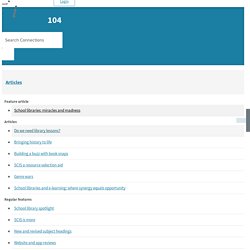
The teacher librarian does the work. And no, I’ve never had to pay out either, as when I don’t know what book to recommend, whether on soccer or on zombies, I put out a Twitter or Facebook post and dozens of teacher librarians answer, with glorious lists of books. Problem solved. That’s anecdotal, but there are studies too: where there are teacher librarians, kids read and achieve more. All-through-life-storytelling-gives-us-meaning-20171128-gzu5is. It starts in childhood with: "Read me a story, please!
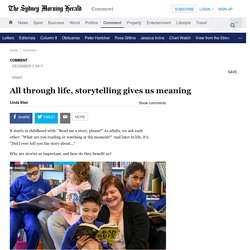
" As adults, we ask each other: "What are you reading or watching at the moment? " And later in life, it's: "Did I ever tell you the story about... " Ditch the exams says Leigh Hobbs, departing Children's Laureate. Why we need qualified teacher librarians for the digital future — Kinderling Kids Radio — music for children and families. The importance of school libraries in the Google Age. This article was originally published in the Term 3, 2016 edition of SCIS’s Connections journal.
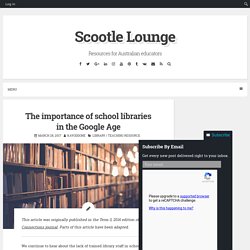
Parts of this article have been adapted. We continue to hear about the lack of trained library staff in schools, despite ongoing research indicating that the presence of teacher librarians leads to improved learning outcomes. Kay Oddone highlights the many benefits teacher librarians can bring to the wider school, and why their role is integral to the learning of both students and staff. In Australia, access to the internet is almost ubiquitous. In 2014–15, 85% of the Australian population aged 15 years and over were internet users, with 99% of people aged 15–17 using the internet.
Literacy MAtters! - Home. Why we need Libraries and Teacher Librarians. Reading for pleasure boosts children academically and emotionally. What is happening?
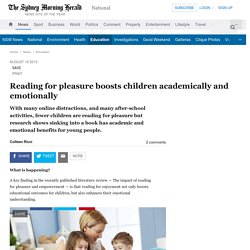
A key finding in the recently published literature review — The impact of reading for pleasure and empowerment — is that reading for enjoyment not only boosts educational outcomes for children, but also enhances their emotional understanding. The study, which was commissioned by The Reading Agency in the United Kingdom, found that reading for pleasure increases empathy, enriches social relationships, reduces symptoms of depression and instils an overall sense of wellbeing. It comes amid evidence that fewer children are reading for enjoyment, and that parents are not reading to their children often enough. What is the purpose of the review? National Simultaneous Storytime Wrap up 2016. What an incredible year it was for National Simultaneous Storytime 2016.
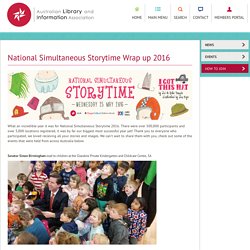
There were over 500,000 participants and over 3,000 locations registered, it was by far our biggest most successful year yet! Thank you to everyone who participated, we loved recieving all your stories and images. Professional learning - School libraries - guides at NSW Department of Education. The seer’s hat. The Merriam-Webster dictionary defines a seer as one who “predicts events or developments” and while I can’t lay claim to having that extraordinary insight that sets such visionaries above the rest of us, in the past few weeks I have had the opportunity and privilege to see what might be in the world of libraries.
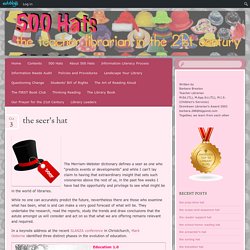
While no one can accurately predict the future, nevertheless there are those who examine what has been, what is and can make a very good forecast of what will be. They undertake the research, read the reports, study the trends and draw conclusions that the astute amongst us will consider and act on so that what we are offering remains relevant and required. In a keynote address at the recent SLANZA conference in Christchurch, Mark Osborne identified three distinct phases in the evolution of education. Skills required in the 21st century How to teach all the skills.
ReadPlus. Apr 15 2015 Library, Reading development and the Internet Learning in the future Digital natives or digital refugees?
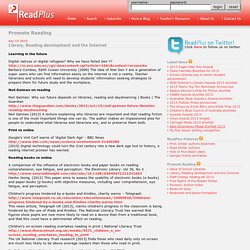
Why we have failed Gen Y? ReadPlus. May 13 2015 Value of School Libraries ASLA Futures paper FINAL - 2013-ASLA-futures- This 2013 report, and 'call to action by key authorities', from the Australian School Library Association, says teacher librarians and school libraries have a pivotal role to play in 21st century education.
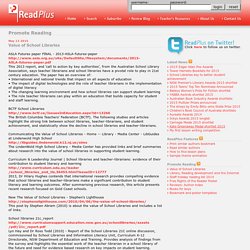
The paper has an overview of: • International and national trends that impact on all aspects of education • The impact of digital technologies and the role of teacher librarians in the implementation of digital literacy • The changing learning environment and how school libraries can support student learning • The role teacher librarians can play within an education that builds capacity for student and staff learning. BCTF School The British Columbia Teachers' Federation (BCTF). The power of a good book. It doesn’t matter what age you are, there’s nothing quite like losing yourself in a good book.
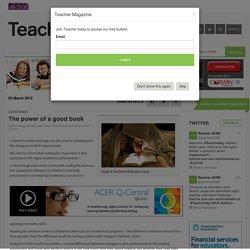
But, did you know that reading for enjoyment is also associated with higher academic achievement? A recent large scale study concluded reading for pleasure has ‘a powerful influence on children’s learning’, particularly in developing vocabulary, but also on spelling and maths skills. ‘Reading for pleasure made a substantial difference [on intellectual progress] – the difference made was around four times greater than the difference made by having a parent with a degree’ (Sullivan, 2014). Analysis of PISA results has shown a ‘crucial difference’ between youngsters who perform well in the reading assessment and those who perform poorly is not how much time they spend reading, but whether they read daily for enjoyment. ‘On average, students who read daily for enjoyment score the equivalent of one-and-a-half years of schooling better than those who do not,’ (OECD, 2011). Libraries in the Digital Age? Yes, They're Still Crucial. (TNS) -- Creative workspaces for people to collaborate on computer-based projects.
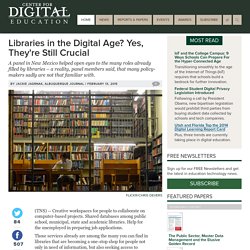
Shared databases among public school, municipal, state and academic libraries. Help for the unemployed in preparing job applications. Those services already are among the many you can find in libraries that are becoming a one-stop shop for people not only in need of information, but also seeking access to modern information technology. The Results Are In: Libraries Matter. — Room to Read Insider. At Room to Read we are passionate about testing our assumptions. We do not want to take for granted that what we’re doing is valuable and effective, we want to be able to prove it and improve it. When it comes to our school libraries, it can be easily supposed that our libraries are enhancing children’s reading habits, but we wanted to test this assumption and find out more. Does having a library help make a child more likely to read for pleasure at school?
One-to-One: Let’s Have One Librarian for Every 1:1 School. Spring has arrived. Despite seasons of budget cutbacks, education leaders are spending again. In the last several months, two separate districts in the Portland (OR) area have visited our district looking for guidance as they seek to invest in technology. One-to-one devices are a favorite. According to TheJournal.com, worldwide spending on K–12 classroom technology exceeded $13 billion in 2013. The report, “Technology in Education: Global Trends, Universe Spend and Market Outlook,” found that technology investments “should continue to grow at a compound annual rate of eight percent through 2018.
Librarians Lead the Way in EdTech. Your School Library - Help for Better Teaching Outcomes. ALIA CEO Sue McKerracher has written an opinion editorial for class ideas K-3 which is a magazine for teachers which provides teacher resources. The article, 'Your School Library, Help for Better Teaching Outcomes' is in the current issue Term 2, 2015 #73. The magazine's editor has kindly provided a pdf of the article so ALIA members can read the story.